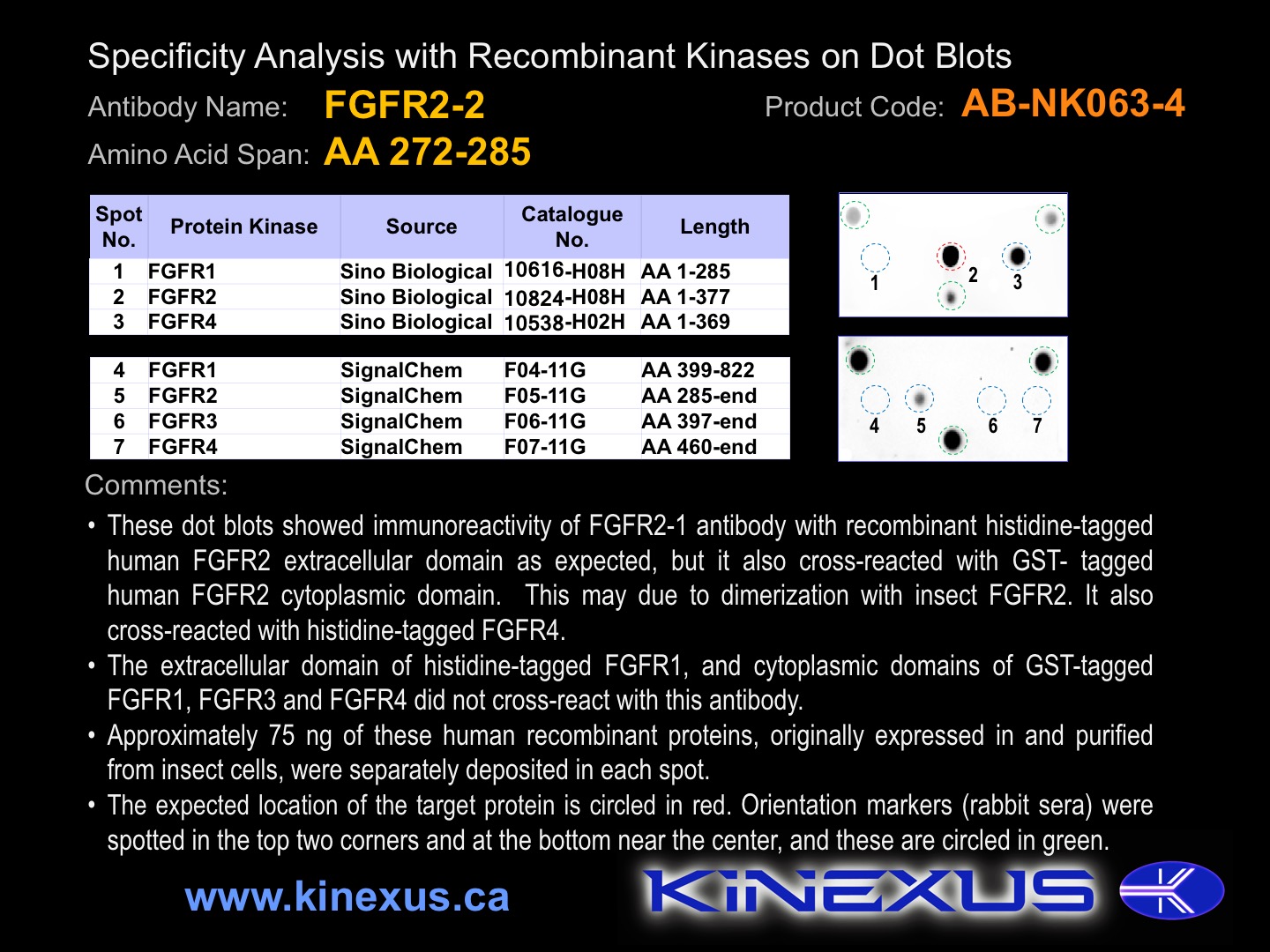Product Name: FGFR2-2
Product Number: AB-NK063-4
| Size: | 25 µg | Price: | 89.00 | |
| $US |
Target Full Name: Fibroblast growth factor receptor-tyrosine kinase 2 (BEK)
Target Alias: BEK; BFR1; BFR-1; CD332; CEK3; CFD1; Crouzon syndrome; ECT1; K-SAM; TK25; KGFR; K-SAM; JWS; CD332; TK14; TK25; ENSG00000066468; Q16888; Q7KZ14
Product Type Specific: Protein kinase pan-specific antibody
Antibody Code: NK063-4
Antibody Target Type: Pan-specific
Protein UniProt: P21802
Protein SigNET: P21802
Antibody Type: Polyclonal
Antibody Host Species: Rabbit
Antibody Immunogen Source: Human FGFR2 (BEK) sequence peptide Cat. No.: PE-01AUF60
Target Alias: BEK; BFR1; BFR-1; CD332; CEK3; CFD1; Crouzon syndrome; ECT1; K-SAM; TK25; KGFR; K-SAM; JWS; CD332; TK14; TK25; ENSG00000066468; Q16888; Q7KZ14
Product Type Specific: Protein kinase pan-specific antibody
Antibody Code: NK063-4
Antibody Target Type: Pan-specific
Protein UniProt: P21802
Protein SigNET: P21802
Antibody Type: Polyclonal
Antibody Host Species: Rabbit
Antibody Immunogen Source: Human FGFR2 (BEK) sequence peptide Cat. No.: PE-01AUF60
Antibody Immunogen Sequence: CGDVEFVCKVYSDAQ
Antibody Immunogen Description: Corresponds to amino acid residues G272 to Q285
Production Method: The immunizing peptide was produced by solid phase synthesis on a multipep peptide synthesizer and purified by reverse-phase hplc chromatography. Purity was assessed by analytical hplc and the amino acid sequence confirmed by mass spectrometry analysis. This peptide was coupled to KLH prior to immunization into rabbits. New Zealand White rabbits were subcutaneously injected with KLH-coupled immunizing peptide every 4 weeks for 4 months. The sera from these animals was applied onto an agarose column to which the immunogen peptide was thio-linked. Antibody was eluted from the column with 0.1 M glycine, pH 2.5. Subsequently, the antibody solution was neutralized to pH 7.0 with saturated Tris.
Antibody Immunogen Description: Corresponds to amino acid residues G272 to Q285
Production Method: The immunizing peptide was produced by solid phase synthesis on a multipep peptide synthesizer and purified by reverse-phase hplc chromatography. Purity was assessed by analytical hplc and the amino acid sequence confirmed by mass spectrometry analysis. This peptide was coupled to KLH prior to immunization into rabbits. New Zealand White rabbits were subcutaneously injected with KLH-coupled immunizing peptide every 4 weeks for 4 months. The sera from these animals was applied onto an agarose column to which the immunogen peptide was thio-linked. Antibody was eluted from the column with 0.1 M glycine, pH 2.5. Subsequently, the antibody solution was neutralized to pH 7.0 with saturated Tris.
Antibody Modification: Unconjugated. Contact KInexus if you are interest in having the antibody biotinylated or coupled with fluorescent dyes.
Antibody Concentration: 1 mg/ml
Storage Buffer: Phosphate buffered saline pH 7.4, 0.05% Thimerasol
Storage Conditions: For long term storage, keep frozen at -40°C or lower. Stock solution can be kept at +4°C for more than 3 months. Avoid repeated freeze-thaw cycles.
Product Use: Western blotting | Antibody microarray
Antibody Dilution Recommended: 2 µg/ml for immunoblotting
Antibody Potency: Strong immunoreactivity with recombinant human FGFR2 on protein dot blots.
Antibody Species Reactivity: Human
Antibody Concentration: 1 mg/ml
Storage Buffer: Phosphate buffered saline pH 7.4, 0.05% Thimerasol
Storage Conditions: For long term storage, keep frozen at -40°C or lower. Stock solution can be kept at +4°C for more than 3 months. Avoid repeated freeze-thaw cycles.
Product Use: Western blotting | Antibody microarray
Antibody Dilution Recommended: 2 µg/ml for immunoblotting
Antibody Potency: Strong immunoreactivity with recombinant human FGFR2 on protein dot blots.
Antibody Species Reactivity: Human
Antibody Positive Control: The observed molecular mass of the processed target protein on SDS-PAGE gels is reported to be around 100-110 kDa.
Antibody Specificity: High
Antibody Cross Reactivity: No immunoreactivity on protein dot blots with recombinant human FGFR1, but medium immunoreactivity with FGFR4.
Related Product 1: FGFR2-2 blocking peptide
Related Product 2: FGFR2 pan-specific antibody (Cat. No.: AB-NK063-2P)
Related Product 3: FGFR2-1 pan-specific antibody (Cat. No.: AB-NK063-3)
Related Product 4: FGFR2-3 pan-specific antibody (Cat. No.: AB-NK063-2)
Related Product 5: FGFR2-pY656+pY657 phosphosite-specific antibody (Cat. No.: AB-PK635)
Antibody Specificity: High
Antibody Cross Reactivity: No immunoreactivity on protein dot blots with recombinant human FGFR1, but medium immunoreactivity with FGFR4.
Related Product 1: FGFR2-2 blocking peptide
Related Product 2: FGFR2 pan-specific antibody (Cat. No.: AB-NK063-2P)
Related Product 3: FGFR2-1 pan-specific antibody (Cat. No.: AB-NK063-3)
Related Product 4: FGFR2-3 pan-specific antibody (Cat. No.: AB-NK063-2)
Related Product 5: FGFR2-pY656+pY657 phosphosite-specific antibody (Cat. No.: AB-PK635)
Scientific Background: FGFR2 (KGFR) is a protein-tyrosine kinase of the TK group and FGFR family. It is a cell-surface receptor for fibroblast growth factors and is critical for cell proliferation regulation, differentiation, migration and apoptosis. It is involved in differentiation and proliferation of osteoblasts and keratinocytes. It is activated by binding of fibroblast growth factor (FGF), which induces dimerization and autophosphorylation. Phosphorylation of Y769 increases phosphotransferase activity and induces interaction with FRS2 and PLCG1. It activates several signalling cascades, such as the MAPK and Akt1 pathway. Missense mutations are associated with ligand independent activation of TK25 (FGFR2) or an activating autocrine signalling loop. Overexpressed TK25 activates STAT1. FGFR2 is a known oncoprotein (OP). Cancer-related mutations in human tumours point to a gain of function of the protein kinase. The active form of the protein kinase normally acts to promote tumour cell proliferation. SNP in intron 2 of FGFR2 has been shown to be significantly associated with breast cancer. Mutations and gene amplifications are involved in various human cancers. Overexpression has been associated with tumourigenesis. Certain missense mutations have been associated with breast, ovarian, endometrial, prostate, bladder, gastric and lung cancers.
© Kinexus Bioinformatics Corporation 2017


